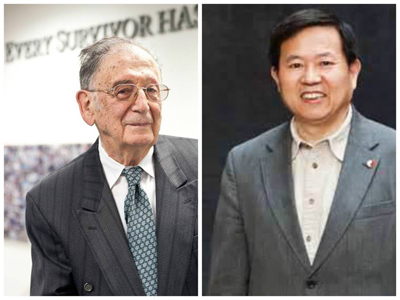
Yehuda Bauer and Xu Xin
Yehuda Bauer and Xu Xin have each led vastly different lives. But they both ended up as two of the world’s most respected and influential Holocaust scholars.
For Bauer, the journey began in Czechoslovakia, where he was born in 1926. He and his family immigrated to Israel in 1939, just before World War II, and he graduated from Cardiff University in Wales after fighting in the 1948 Arab-Israeli War. He received his PhD in 1960 at Hebrew University in Jerusalem and began teaching at its Institute for Contemporary Jewry the following year.
Bauer embarked on a long and highly influential scholarly career that would span universities around the world including Brandeis, Yale, and his current post as academic advisor at Yad Vashem. He is the founding editor of the journal Holocaust and Genocide Studies and author of books including Rethinking the Holocaust, Out of the Ashes, and Death of the Shtetl.
Bauer is well-known for his strongly-held and often controversial views of the Holocaust. He is an atheist, explaining in an interview with Haaretz in February, “One can talk about my God − the God of Abraham, Isaac and Jacob − who does not exist because, if he does exist, he is Satan and therefore is not God. The universe he supposedly wanted is oriented toward death. Everything, from galaxies to grasshoppers, is born to die.
“The murder of at least one million children under the age of 13 in the Holocaust − no matter what the reasons − makes God responsible for murder. Even if God turned his face away because he did not want to be a witness to the evil deeds of man, he is no less guilty than the Nazis if he knew and did not intervene,” Bauer said.
He also rejects the argument that the Allies could have prevented the Holocaust or saved Jews from death camps.
However, Bauer also believes that Jewish resistance during the Holocaust was significant, and that it sets the Jewish reaction to genocide apart from other victims’ responses to genocides.
Bauer has a long history with USC Shoah Foundation. He has consulted on a variety of projects for the Institute since the mid-1990s and used the Visual History Archive to conduct research for Death of the Shtetl. He was the Institute’s 2012 Yom Hashoah Scholar-in-Residence.
Xu graduated from Nanjing University with a degree in English in 1977. He says he was first introduced to Jewish culture through American Jewish literature of the ‘60s and ‘70s, and took a great deal of interest in Jewish writers after two of them won the Nobel Prize for literature – Saul Bellow in 1976 and Isaac Singer in 1978.
In 1985, while teaching at Nanjing University, Xu met Joseph Friend, a Jewish professor from Chicago, who invited Xu to come to the United States and stay with him. During Xu’s two years in Chicago, he was immersed in Jewish culture, and he left literature for the field of Jewish Studies permanently.
After he returned to China in 1988, he founded Nanjing University’s Institute of Jewish Studies and published the first Chinese edition of the Encyclopedia Judaica. Today, Xu oversees the MA and PhD programs in Jewish Studies – the latter of which sends all of its students on a trip to Israel before they graduate. He has written several books and lectured around the world.
Xu says that while Jewish culture and history isn’t well-known in China, the Jews’ struggle to balance their traditions with modernization is one China can relate to and learn from.
“People ask me, ‘Why are you in this field?’ and I say, ‘Because Chinese people need to know about Jews,’” Xu said in The Jerusalem Post in 1998. “The Jewish people did not know about Chinese civilization for thousands of years and survived. Now it is we Chinese who need to know about Judaism because this is part of the basis of Western civilization. China wants to become a responsible nation, join the international community and play a role in the world, particularly in the 21st century. And we have a slogan: ‘Not to understand Jewish culture is not to understand the world.’”